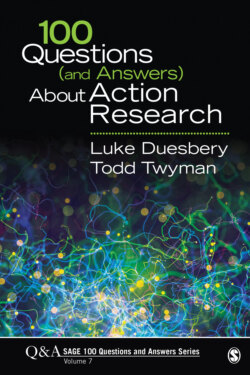Читать книгу 100 Questions (and Answers) About Action Research - Luke Duesbery - Страница 18
На сайте Литреса книга снята с продажи.
Question 9 What Is an Action Research Disposition?
ОглавлениеGot a question? Need an answer? Action research is ideal for the person who enjoys inquiry. An inquiry-oriented disposition begins with posing questions instead of stating facts. Those with an inquiry-oriented disposition understand that answers depend on many things. This stands in stark contrast to the traditional positivist research disposition, which holds that there are universal truths that might be applied in all situations. While this is of course appealing to our sense of order and need for structure, an action research disposition admits that we cannot know all.
A close parallel across disciplines might be problem-based learning (PBL). A PBL paradigm is situated within a scenario that needs some kind of resolution. To be clear, in action research, we do not research out of curiosity; we conduct research because we need and want to make change.
Action researchers are curious, but also driven. We are open to suggestions, but also eager to implement action. We are logical with planning, skeptical of “what research says.” So much of what is thought to be known entirely depends on context.
For example, traditional research tells us that a vaccination for polio is most effective when applied at a young age and that vaccination should be repeated at ideal intervals to optimize effectiveness. That same research does not tell us why the vaccination might not work. In a population with high levels of seasonal migration, where follow-up vaccinations are unlikely, is single vaccination effective? Do the benefits of single vaccination outweigh the risks of side effects? We might investigate the deployment of a modified vaccination schedule that looks closely at a local population, instead of relying on ideals and averages.
Action researchers are, above all, flexible and reflective. Local data, local context, and local control. Action researchers take meaningful actions that lead to better understanding and knowledge. Action researchers do not ignore traditional research findings. We take it with a grain—no, a dash—of salt.
More questions? See questions 10, 21, and 22.
